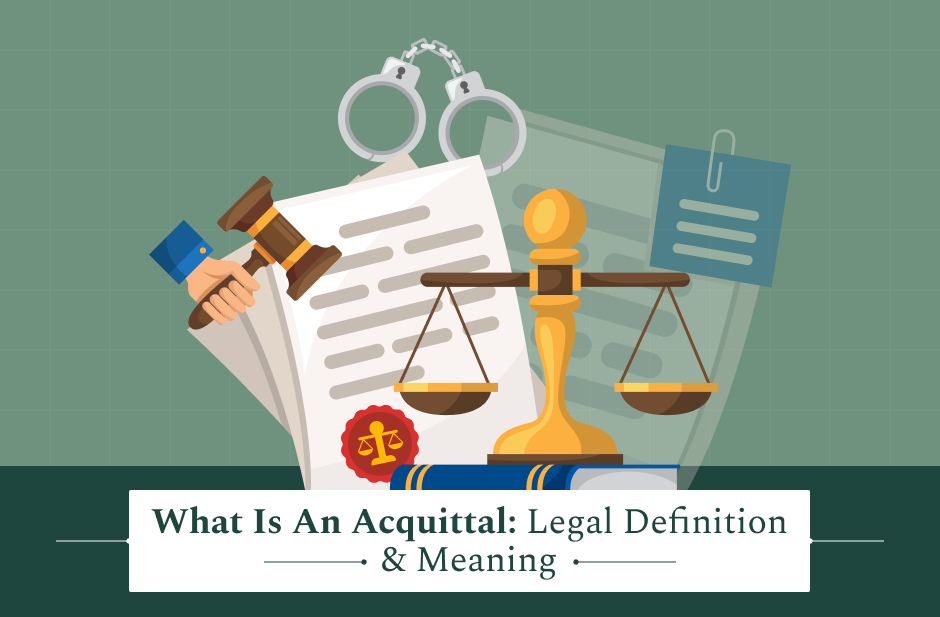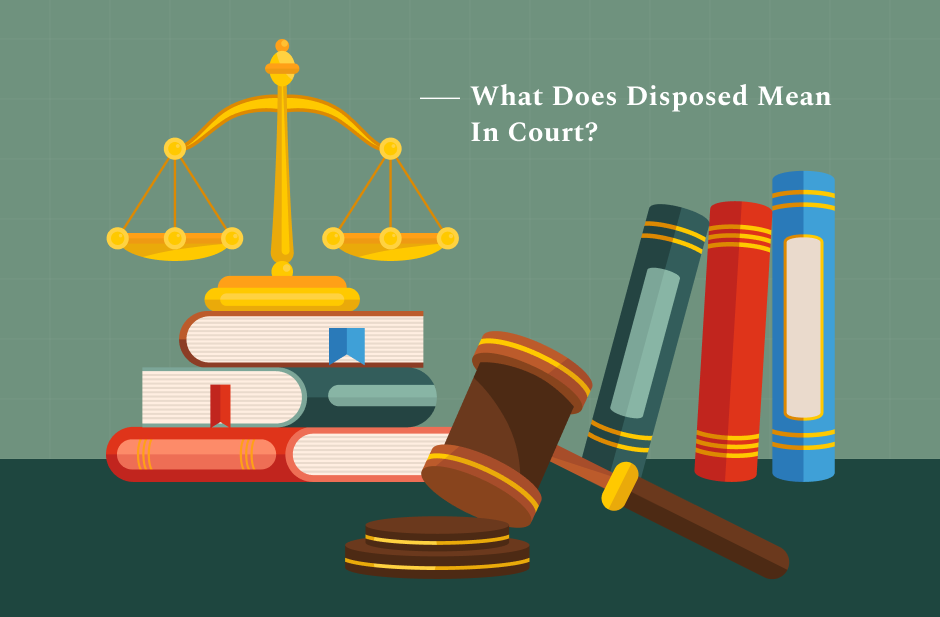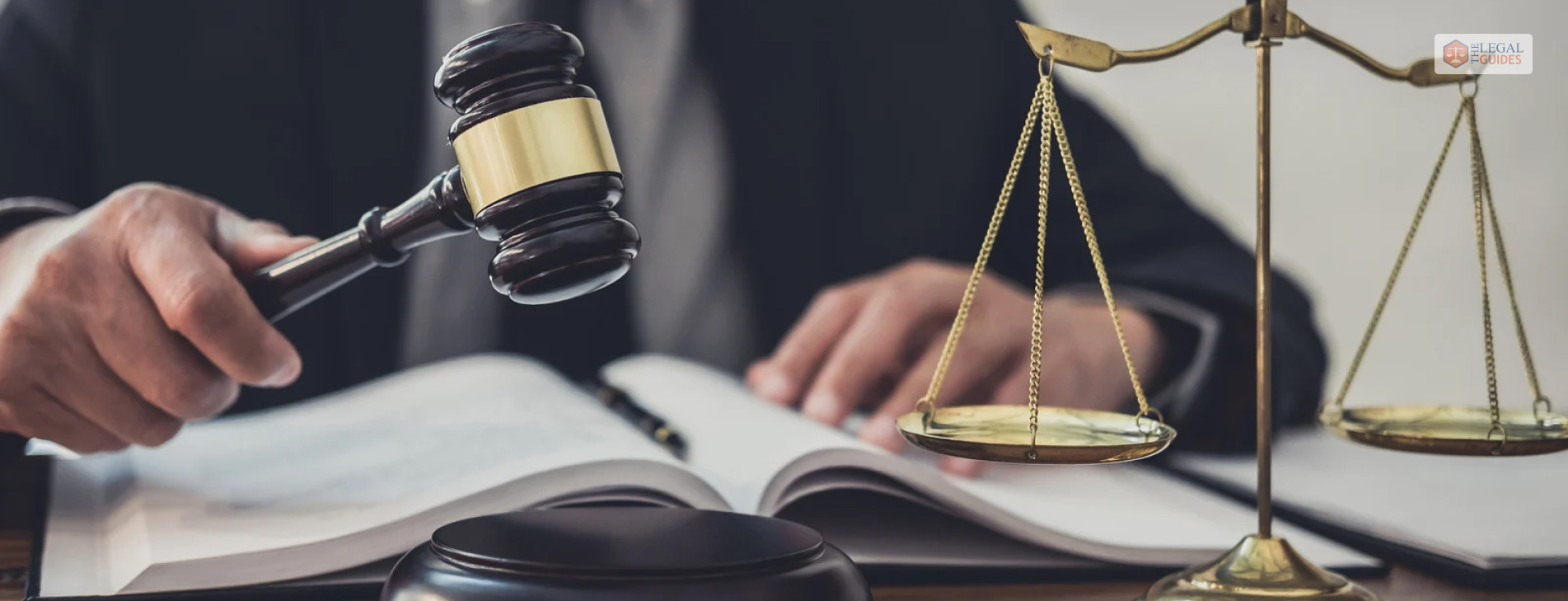One of the most significant positive results in criminal law is an acquittal. Irrespective of whether you are a defendant, victim, or legal spectator, it is essential to know its importance. Besides legal freedom, acquittal also influences the public’s perception and subsequent proceedings.
To give you a small example, it is worth noting that after O.J. Simpson was cleared of murder charges in a widely publicized trial, the case became an example of the differences between criminal and civil proceedings.
Hence, although he was acquitted of the criminal point of view, he was still held responsible for the wrongful death in the civil case.
In this article, I will explain the following things:
- What is an acquittal?
- Types and key aspects.
- Legal consequences of an acquittal.
- Why does it matter?
So, if these are some of the things that you want to know, keep on reading this blog till the end…
What Does Acquittal Mean?
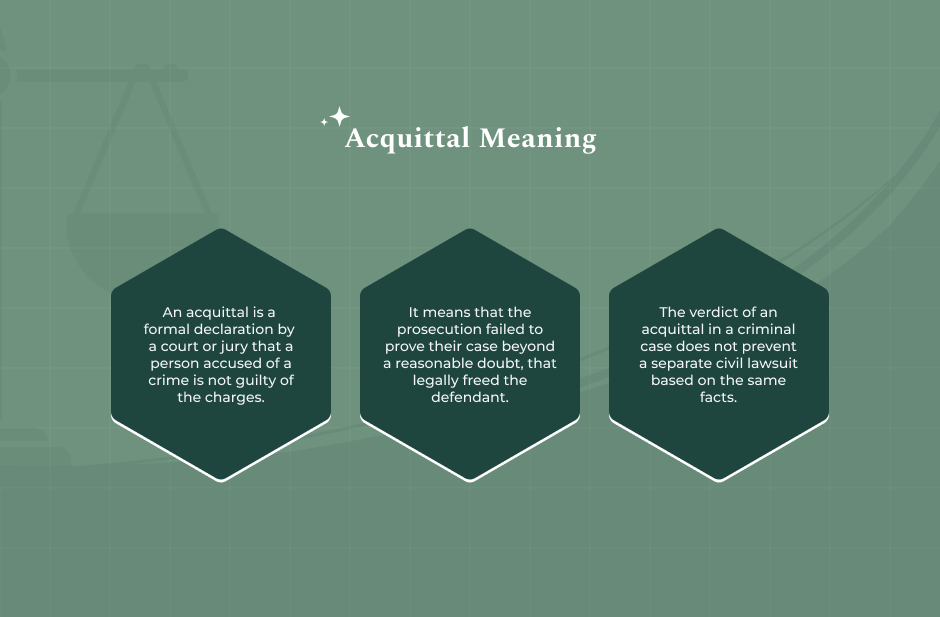
Legally, an acquittal occurs when a judge or jury determines that the prosecution has failed to prove each element of a criminal charge beyond a reasonable doubt, resulting in a verdict of “not guilty.”
“One who is acquitted is judicially discharged from an accusation and is absolved,” according to the Legal Information Institute. This formally discharges the defendant from criminal liability.
Notably, an acquittal doesn’t declare innocence. It only affirms that guilt has not been proven. Legal experts and law firms state that “an acquittal is a specific type of exoneration that occurs within the confines of a criminal trial.” In other words, it reflects reasonable doubt, not exoneration.
What Are The Types Of Acquittal?
Acquittal is classified into three broad categories. These are:
- Complete Acquittal: No charge is left standing from the court as the verdict is “not guilty”.
- Partial Acquittal: The defendant is declared innocent in some charges and guilty in others, so they are not fully free.
- Implied Acquittal: Happens if the jury comes to a conviction of the lowest-offense case and thus gives a signal of acquittal from the highest-offense case.
What Are The Key Aspects Of An Acquittal?
When talking about an acquittal, the following aspects are essential to know about:
- Not Guilty Verdict
- Failure of Proof
- Judicial Discharge
- Legal Freedom
- Protection from Retrial
How Does An Acquittal Happen?
There are multiple reasons and situations that lead to an acquittal. This is what occurs in a court case:
- Jury Verdict: The members of the jury in a jury trial vote for a verdict of “not guilty” for the defendant.
- Judge’s Decision: When a judge believes that the prosecution has done little or no presentation of evidence to help make the case, he is entitled to issue an order for a verdict of not guilty.
- Dismissal of the Case: A court, after a thorough trial, determines that the prosecution has failed in its case and decides that the charges shall be rejected.
- Unlawful Decree of Crime: The suit may have been terminated due to some errors in the procedure or legal fictions.
What Are The Legal Consequences Of An Acquittal?
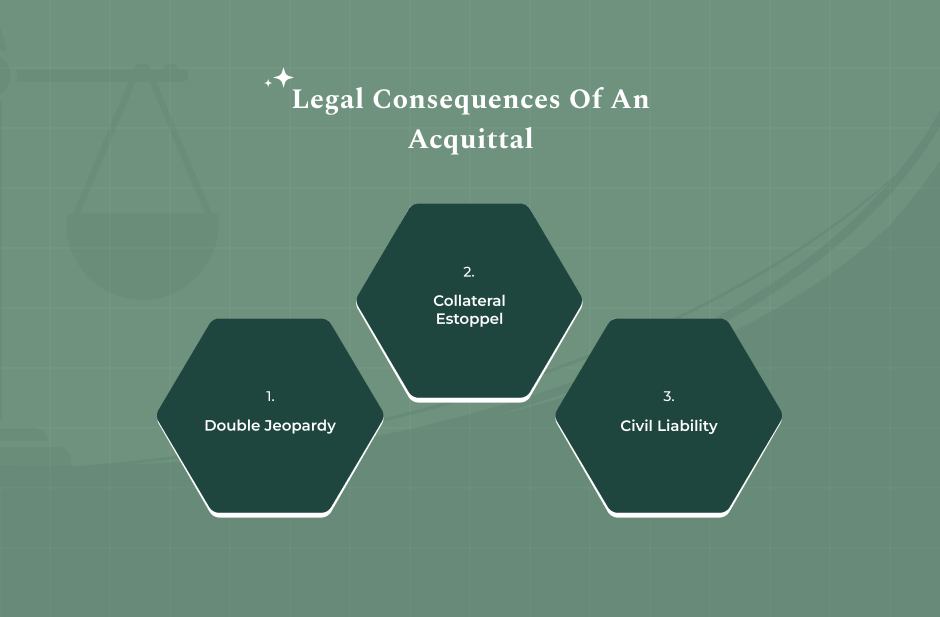
Now that you are aware of what an acquittal is, it is time for you to see what the legal impacts and consequences of such a verdict are. Here are a few things that you need to know:
Double Jeopardy
If a person gets an acquittal, the Double Jeopardy clause of the U.S. Constitution gets triggered. It is basically the protection for the defendant against being put on trial again for the same offense in the same court.
Regardless, there are some exceptions that come in handy. For example, the principle of dual sovereignty permits separate state and federal prosecutions for the same conduct.
Civil Liability
Those who have been acquitted of criminal charges can also be sued for civil lawsuits—just like in the case of O.J. Simpson, where a criminal acquittal did not provide a shield against later civil liability.
Non-Criminal Consequences
According to the news published by The Times of India, a recent ruling by the Madras High Court in India emphasized that an acquittal in criminal proceedings doesn’t prevent departmental disciplinary action. This is primarily because the standards of proof differ.
In other words, criminal trials require “beyond a reasonable doubt,” whereas departmental proceedings often use “preponderance of probabilities.”
Record & Reputation
Acquittals might not erase arrest records automatically. Many jurisdictions require separate expungement or sealing requests. Additionally, the public trust may remain damaged regardless of legal clearance.
What Is The Importance Of An Acquittal?
It is important to note that an acquittal may not necessarily prove that the defendant is innocent. However, it is still a very important principle of the criminal justice system that guilt should be proven beyond a reasonable doubt.
Here are a few reasons why it matters:
- It prevents a defendant from being wrongly convicted.
- It provides an assurance that the criminal justice system is fair.
- Affects victims, families, and public trust.
This acquittal offers legal closure and civil protections such as double jeopardy, although it cannot completely get rid of the social or administrative consequences.
Additionally, to understand the intricacies of the case—including the legal procedure, legal effects, and real-life consequences—both legal professionals and the public are empowered.
Read Also: How To Appeal A Criminal Conviction With A Defence Lawyer
Frequently Asked Questions (FAQs):
Here are some of the questions that most people also ask when searching for what is an acquittal. Take a look at them before you leave:
Can You Be Retried After An Acquittal?
Generally, no. The court does not sit for a retrial after passing an acquittal verdict. This is because double Jeopardy precludes retrial for the same offense in the same jurisdiction.
Does An Acquittal Mean You’re Innocent?
Getting a verdict of Acquittal from the court does not legally mean that you are innocent. It simply means that the prosecution and the jury were unable to prove the person guilty of a charge/crime beyond a reasonable doubt.
Can You Sue For Wrongful Prosecution After Acquittal?
Yes, acquittal doesn’t bar a civil suit. You can sue someone for wrongful prosecution after an acquittal. However, you must meet civil standards of proof.
Does An Acquittal Expunge Your Criminal Record?
An acquittal does not expunge or remove you from the criminal record. At least not by default. An expungement requires separate legal action and varies by jurisdiction.








